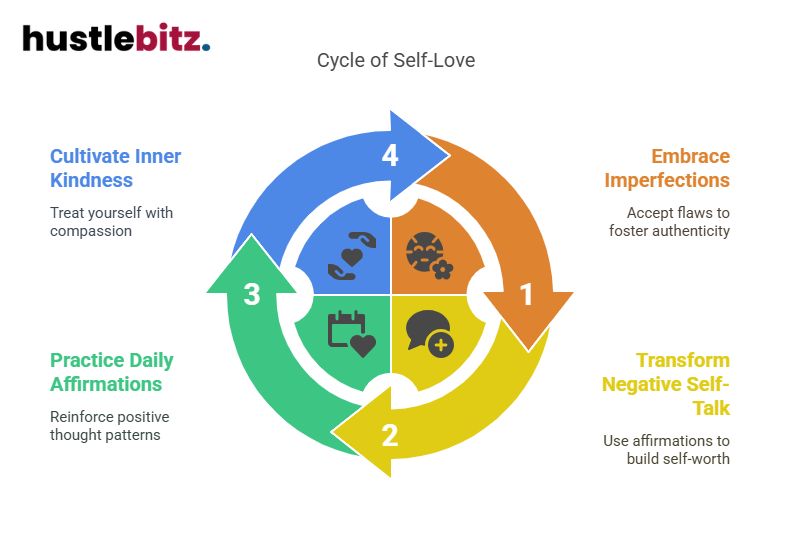Cultivating self-love is fundamental for emotional well-being and personal growth. Compassionate quotes can inspire a gentler inner dialogue and foster a supportive self-relationship. Acknowledging imperfections and celebrating one’s unique qualities nurtures authenticity and resilience. Techniques such as positive affirmations combat negative self-talk, reinforcing a healthier self-image. Emphasizing inner kindness and self-acceptance, these quotes remind us that our worth is intrinsic and not tied to external validation. By integrating this wisdom into daily practice, we can transform our inner narrative. Explore further for more insights and practices that can enhance your journey toward self-love and kindness.
Key Takeaways
- Self-love is crucial for emotional well-being, fostering resilience and healthier relationships through self-acceptance and appreciation.
- Embrace imperfections to nurture authenticity and deepen your self-acceptance journey, finding beauty in flaws.
- Transform negative self-talk by using positive affirmations and cognitive reframing to reinforce self-worth and emotional strength.
- Daily affirmations reprogram thought patterns, enhancing self-love and promoting personal growth through consistent practice.
- Cultivating inner kindness through compassionate self-treatment empowers a positive self-view and nurtures emotional resilience.

Understanding Self-Love
Self-love is a fundamental aspect of emotional well-being that involves recognizing and valuing one’s own worth and treating oneself with kindness and compassion. Understanding self-love is not merely about self-indulgence; it is an essential part of the self-acceptance journey that promotes personal growth and emotional resilience. Through self-love, individuals can engage in a transformative process that fosters a healthier relationship with themselves and, by extension, with others.
A critical component of self-love is the recognition of one’s intrinsic value, which empowers individuals to nurture relationships that are supportive and affirming. By valuing oneself, people are better positioned to establish boundaries and cultivate connections that enhance their overall emotional well-being. This nurturing of relationships is often reciprocal; as individuals practice self-love, they naturally foster an environment that encourages others to do the same.
In addition, integrating mindfulness practices into daily routines can significantly bolster self-love. Mindfulness allows individuals to remain present and aware of their thoughts and feelings, promoting a compassionate observation of oneself without judgment. This approach not only aids in developing emotional resilience but also encourages individuals to embrace their imperfections, thus enhancing their overall self-acceptance.
Ultimately, understanding self-love is crucial for anyone seeking to improve their emotional health. It lays the foundation for a fulfilling life marked by personal growth, meaningful connections, and a deep-seated appreciation for oneself.
The Importance of Compassion

Compassion plays a vital role in fostering emotional well-being, as it involves recognizing and responding to the suffering of oneself and others with kindness and understanding.
Engaging in self-compassion practices enables individuals to be gentle with themselves during difficult times, promoting a healthier self-image and a more resilient emotional state. This internal kindness not only alleviates personal suffering but also enhances empathy development, allowing individuals to connect more deeply with the experiences of others.
By cultivating compassion, we build emotional resilience—a critical component for navigating life’s challenges. When we practice mindfulness techniques, we become more attuned to our thoughts and feelings, creating space for self-compassion to flourish. Mindfulness helps us to observe our emotional responses without judgment, fostering an environment where nurturing relationships can thrive.
These relationships, grounded in mutual understanding and kindness, further support our emotional health and reinforce the cycle of compassion.
In essence, the importance of compassion lies in its transformative power. It encourages us to embrace our vulnerabilities and imperfections, ultimately leading to a more fulfilling and connected life.
Embracing Imperfections
Embracing imperfections is a vital aspect of personal growth, as it allows individuals to acknowledge their flaws and cultivate a deeper sense of self-acceptance. In a world that often glorifies perfection, learning to embrace flaws can be a transformative journey. By accepting vulnerability, individuals open themselves to genuine connections and deeper relationships, both with themselves and others.
Consider the wisdom in the words of those who champion the beauty of being imperfect. “Imperfections are not inadequacies; they are reminders that we are all unique,” speaks to the essence of nurturing authenticity. Each person’s journey is marked by distinct experiences and characteristics that contribute to their individuality. Celebrating uniqueness becomes a powerful practice that fosters self-love and acceptance.
Moreover, the pursuit of finding beauty in imperfections encourages a more compassionate perspective towards oneself. “Your imperfections are the threads that weave the tapestry of your life,” highlights the idea that every flaw adds depth and richness to our narrative. Embracing these elements allows for a more holistic understanding of self, inviting individuals to recognize that perfection is an illusion.
Through these reflections, cultivating self-love becomes an active engagement in recognizing and appreciating our innate imperfections. By embracing flaws, accepting vulnerability, and celebrating uniqueness, we pave the way for a life marked by authenticity and genuine fulfillment. In this journey, we learn that our imperfections are not barriers but rather bridges to a more profound understanding of who we truly are.
Words to Quiet the Inner Critic

When negative self-talk arises, it is essential to counter it with affirmations that reinforce your worth and capabilities. Engaging in a positive inner dialogue can help shift your perspective from a critical mindset to one of self-acceptance and compassion.
Consider using nurturing thoughts such as, ‘I am enough just as I am,’ or ‘I embrace my flaws as part of my unique journey.’ These statements can serve as powerful reminders that imperfections do not define your value.
Emotional resilience is cultivated through the practice of acknowledging and reframing negative thoughts. Instead of allowing the inner critic to dominate your thoughts, practice saying, ‘I am learning and growing,’ or ‘Every step I take is a step towards improvement.’ This approach not only quiets the inner critic but also fosters a sense of empowerment and self-acceptance.
Additionally, when you feel overwhelmed by self-doubt, remind yourself that it is okay to seek support. Phrases like, ‘I am worthy of love and kindness,’ can help affirm your inherent value.
Remember, nurturing thoughts are vital in combating the harshness of a critical mindset. By consciously choosing to speak gently to yourself, you pave the way for greater emotional resilience, enabling you to face challenges with a kinder perspective.
Ultimately, the journey towards self-love requires patience and practice, but the rewards of self-acceptance and inner peace are well worth the effort.
Affirmations for Daily Practice

Incorporating daily affirmations into your routine can significantly enhance your journey towards self-love and personal growth. These powerful statements serve as a foundation for self-love practices, fostering a positive mindset that empowers individuals to embrace their worth and potential. By consciously affirming beliefs that align with self-compassion, you create an environment conducive to emotional healing and resilience.
Daily affirmations can take various forms, from simple phrases like ‘I am enough’ to more elaborate declarations that reflect your personal aspirations. The key is to ensure that these affirmations resonate with your inner self and reflect your true desires. By repeating these affirmations regularly, you help to rewire your thought patterns, shifting from negative self-talk to nurturing self-compassion. This practice not only counters self-doubt but also reinforces your commitment to self-improvement.
Furthermore, integrating daily affirmations into your routine can act as a catalyst for change. As you cultivate a positive mindset, you may notice an increase in your overall well-being and emotional stability. This transformation is not instantaneous; it requires consistent effort and patience. However, the benefits of affirming your self-worth and embracing your unique identity are profound.
In essence, daily affirmations are a vital tool in the cultivation of self-love. They empower you to confront and dismantle limiting beliefs, paving the way for a more fulfilling and compassionate existence. By committing to this practice, you can unlock the door to a deeper, more nurturing relationship with yourself.
Cultivating Inner Kindness

Cultivating inner kindness begins with recognizing the importance of self-compassion in fostering a nurturing relationship with oneself. Embracing self-kindness practices allows individuals to engage in inner dialogue shifts that promote a more positive self-view. By prioritizing nurturing self-compassion, we create a supportive environment that enhances our emotional resilience and fortifies our ability to cope with life’s challenges.
To further illustrate this concept, here are some quotes that encapsulate the essence of cultivating inner kindness:
| Quote | Source |
| “Be gentle with yourself. You’re doing the best you can.” | Unknown |
| “You are enough just as you are.” | Brené Brown |
| “Self-care is not a luxury; it is a necessity.” | Audre Lorde |
| “Talk to yourself like you would to someone you love.” | Brené Brown |
Incorporating these self-care strategies into daily life can significantly impact our overall well-being. By consciously shifting our inner dialogue, we can replace self-criticism with affirmations of worth and value. This approach not only enhances our self-esteem but also promotes emotional resilience building. Ultimately, cultivating inner kindness is a journey that empowers us to treat ourselves with the same compassion we extend to others, creating a more harmonious and fulfilling life experience.
Celebrating Your Worth

Recognizing and celebrating your worth is a vital step in the journey of self-love, as it reinforces the inner kindness we strive to embody in our daily lives. A self-worth celebration not only enhances our personal value but also fosters intrinsic appreciation for who we are. This acknowledgment is crucial in our self-acceptance journey, allowing us to embrace our strengths and imperfections alike.
Here are some empowering quotes that encapsulate this essence of worthiness recognition:
- “You are enough just as you are.” – A reminder that your inherent value does not hinge on external validation.
- “Your worth is not measured by your productivity.” – A powerful assertion that celebrates being over doing, emphasizing the importance of self-acceptance.
- “Celebrate who you are in your deepest heart. Love yourself and the world will love you.” – This quote highlights the transformative power of self-love and its ripple effect on those around you.
- “Your value doesn’t decrease based on someone’s inability to see your worth.” – A profound statement that encourages resilience in the face of doubt from others.
Embracing these sentiments allows for a more profound understanding of one’s worth, fostering a nurturing environment for personal growth. By internalizing these messages, we not only honor ourselves but also inspire others to embark on their own journeys of worthiness recognition.
Transforming Negative Self-Talk

Transforming negative self-talk into positive affirmations is essential for fostering a healthier self-image and nurturing self-love. Many individuals grapple with self-talk patterns that reinforce negative beliefs, creating a detrimental inner dialogue that can affect mental well-being. Recognizing these harmful thought processes is the first step toward change.
Cognitive reframing is a powerful technique that allows individuals to challenge and modify their negative beliefs. By consciously identifying distorted thoughts, such as ‘I am not good enough,’ and replacing them with empowering affirmations like ‘I am worthy and capable,’ one can reshape their inner dialogue. This practice not only mitigates the impact of negative self-talk but also enhances emotional resilience, empowering individuals to face life’s challenges with a more positive mindset.
It is important to understand that transforming negative self-talk is not an overnight process; it requires consistent effort and patience. Keeping a journal to track self-talk patterns can provide insights into recurring themes and triggers. Additionally, incorporating mindfulness techniques can help individuals become more aware of their thoughts and feelings, enabling them to respond with compassion rather than criticism.
Ultimately, the journey to transforming negative self-talk is about cultivating self-love and acceptance. By actively engaging in this process, individuals can build a more supportive inner dialogue, leading to improved self-esteem and an overall sense of well-being. Embracing this transformation can be a profound step towards a more fulfilling and compassionate relationship with oneself.
Final Thoughts
Cultivating self-love is an ongoing journey that involves embracing imperfections, fostering inner kindness, and transforming negative self-talk into positive affirmations. By integrating compassionate practices into your daily routine, you can nurture a stronger relationship with yourself, one that is grounded in self-acceptance and emotional resilience. Remember, self-love is not about perfection; it is about honoring your worth, celebrating your unique qualities, and treating yourself with the kindness you deserve. As you continue this journey, be patient with yourself and recognize that every step, no matter how small, contributes to a more fulfilling and compassionate life.




